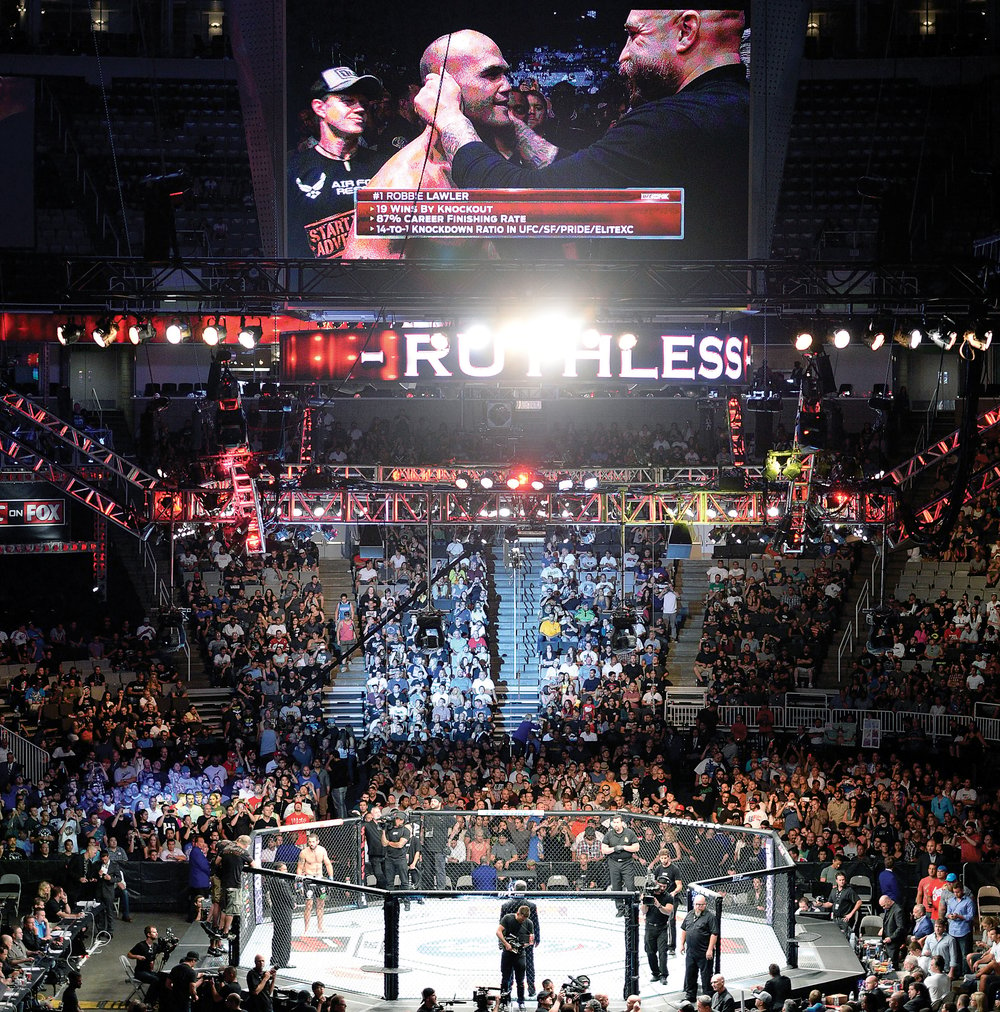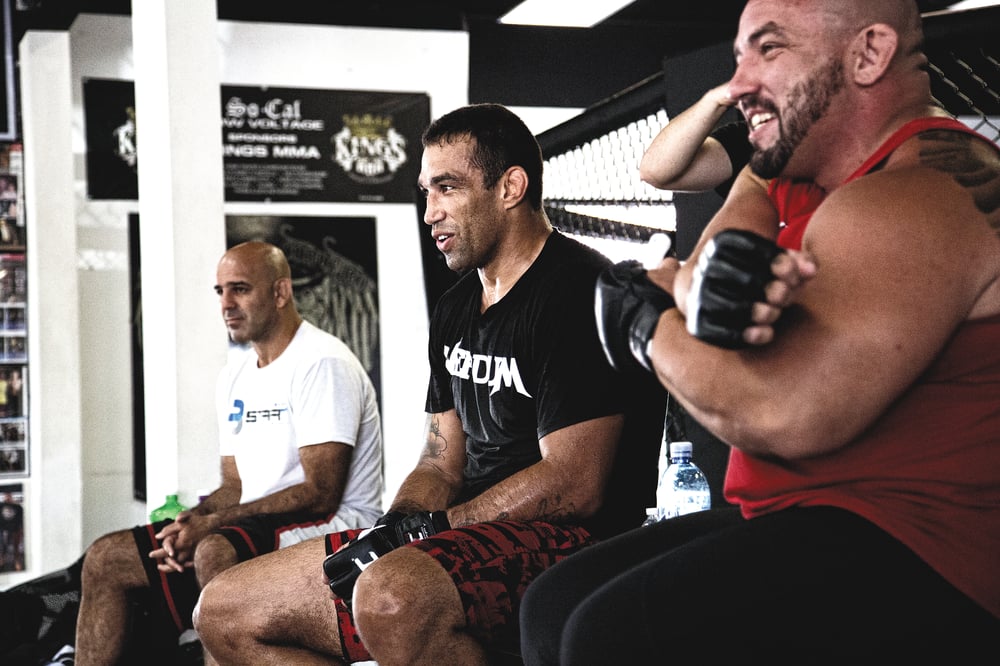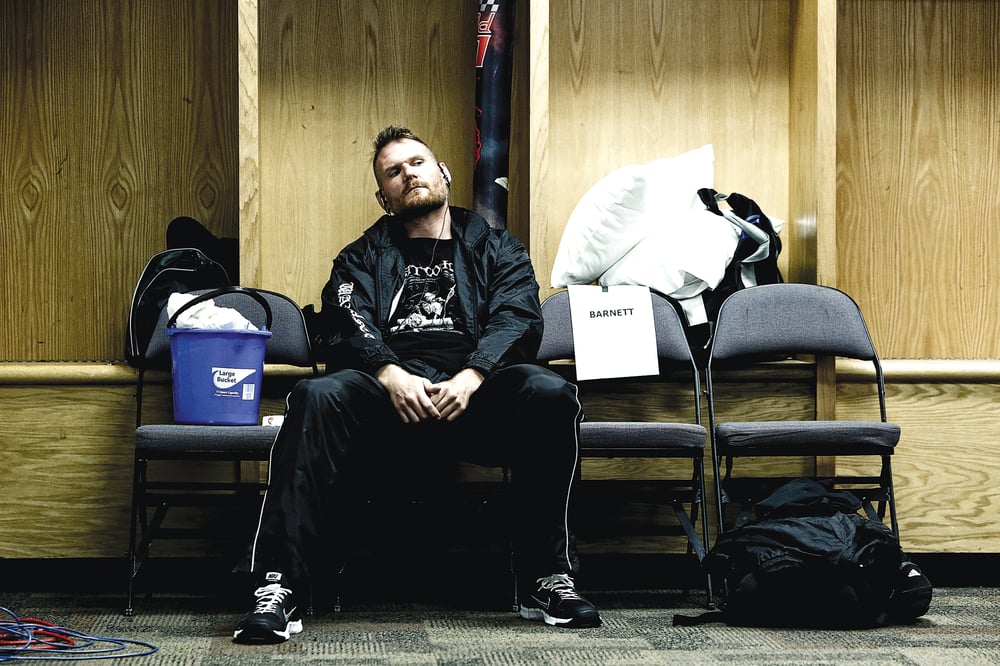
Issue 122
December 2014
Being cut from the UFC can be devastating to a fighter. But as some have proven, it can also make an Octagon return all the more spectacular.
When listening to fighters whose contracts have been severed by the Ultimate Fighting Championship (UFC), the phrase ‘everything happens for a reason’ crops up more than any other. It is their comfort blanket, their daily mantra and a reminder that no matter how bleak life may seem, it’s all leading to something greater. But that doesn’t necessarily mean they believe what they’re saying.
Typically, a fighter can be cut from the UFC for any number of reasons. The first, and most common, is the unofficial three strikes and you’re out rule, whereby a down-on-their-luck mixed martial artist can’t seem to buy a win and eventually suffers a run of consecutive defeats and is given their marching orders.
This happens all the time. Often it doesn’t even require three defeats. The likes of Jake Shields, Jon Fitch and Gerald Harris can attest to that, as all three were dropped following single losses. The reason? The manner of the defeat. Their performances weren’t deemed exciting enough for the Octagon.
Performances aside, there are other reasons fighters face the dreaded chop. Unsportsmanlike behavior, for example, has seemingly ended the UFC careers of rebels Paul Daley and Rousimar Palhares, both of whom broke the martial arts etiquette in their own destructive ways. And missing weight has also proven to be a deal-breaker for the likes of Anthony ‘Rumble’ Johnson and Efrain Escudero, two men who had issues with the scales, lost a fight and were then promptly sent packing.
“At one point,” says lightweight Escudero, “I had a problem with making weight and that happened to come towards the end of my first period with the UFC. I think that was part of the reason I got cut. They wanted to make an example and they sure did. I learned a lot from it, though. I now know how to maintain my weight and do certain things better. It worked.”
Sometimes the reason for dismissal doesn’t even have anything to do with fighting. Miguel Torres’ lewd joke on Twitter in 2011 saw him reprimanded and fired, and both
Benjamin Brinsa and Will Chope, two UFC newcomers, were banished from the organization when it was discovered the former had alleged Neo-Nazi ties and the latter had formerly been charged with domestic violence.

But, for the most part, a career in the Ultimate Fighting Championship comes to an end when an athlete no longer shows signs of being able to work their way towards, well, the championship. If you dither, are dull or suffer defeat after defeat, you’re gone. Most take the decision with good grace. For some, it’s an expected next step in the process.
Welterweight Ben ‘Killa B’ Saunders competed on The Ultimate Fighter season six, won three straight fights in the UFC and then won only one of his next four. A 2010 loss to Dennis Hallman, hot on the heels of a defeat to Jon Fitch, spelled the end for him.
“Obviously losing sucked, but my overall experience was great,” he recalls to FO. “It was definitely a little up and down, a little bi-polar. You’re going to get better and tougher competition as you go along and that’s what happened.
“Still, I was a baby back then. I was on The Ultimate Fighter at 24 years of age. I had four wins and two draws. I don’t know how many people get into the UFC with only four wins on their record, but it can’t be many.”
Escudero had a similar route to the Octagon. He too arrived via The Ultimate Fighter. He even won season eight. “It was a good experience and I had a lot of fun,” he says of his first stint in Octagon. “We had our ups and downs. It was all a learning experience.
“Once you get above those local promotions and you’re fighting the best in the world on a regular basis, you’ve got to be ready and you’ve got to expect tough challenges. Age wasn’t an issue for me. Yes, I was young at 22, but I’d won The Ultimate Fighter and felt I belonged with the best in the world.
“I was a broke-ass college student signing a six-figure contract with the UFC. I was thankful for the exposure.”
The promise Escudero showed in the TUF house fizzled out soon after, however. Sure, subsequent wins over Cole Miller and Dan Lauzon continued the hype train, but submission defeats to Evan Dunham and Charles Oliveira slammed on the brakes and triggered his release from the organization.
“I just got back on the horse and continued to fight,” says Escudero, who went and fought elsewhere, primarily on smaller promotions in Arizona and California, for most of 2011. “Nothing changed for me. Everything happens for a reason and I was able to get some wins and work my way back to where I wanted to be. I knew I was going to make it back and knew it was only a matter of time.
“While you’re in the UFC you start making connections and contacts. You meet people that know people and it becomes easier to cope with a life away from the UFC. Fights weren’t hard to come by for me. I just wanted to stay busy and get as many wins as I could.”

The road to reconciliation for Saunders was less straightforward, however. First he had to contend with being cut. “Truthfully,” he says, “I kind of knew it was coming. In the back of my head, I was thinking, ‘Well, the Fitch fight was kind of short notice and I helped them out, but I also lost the fight.’
“They said I had skills and talent but the welterweight division was overrun with high-quality wrestlers. They said I needed to get my wrestling and takedown defense on point and to also work on my jiu-jitsu off my back. I completely understood.
“If you look at the last two fights I had with them, and how I lost, you’d see all of that. You’d know they were talking sense. Those guys also happened to be some of the best wrestlers in the world, but who cares? They were absolutely right.”
After the cut came the realization of inadequacy and the need to improve. It was a challenge he approached with gusto. “Getting cut allowed me to grow up mentally and to also be more confident in my skills moving forwards,” Saunders continues. “I knew I needed to get better but I also knew I wasn’t far off where I needed to be.
“Once I got cut, all I did was work on my wrestling and takedown defense for months and months. I should’ve done that before. On top of all that, I really worked hard on my bottom game. Now I don’t care if you take me down. I feel very confident and comfortable off my back. I’m going to make you work and make you defend.”
Escudero was back in the UFC within 14 months of being cut. He too had made improvements, more in attitude and maturity than anything else, but in the end it didn’t matter. Problems at home, he says, led to further defeats in the UFC, this time against Jacob Volkmann and Mac Danzig, and once again he was released.

Saunders, meanwhile, played the long game. He had no choice in the matter. It would be some four years before he got back to the UFC.
“I definitely thought it would be a lot sooner, man,” says ‘Killa B’. “I thought I’d be back in a year. Joe Silva (UFC matchmaker) said all I had to do was go and get two or three wins. I said, ‘You got it, man.’ That was my plan.
“Unfortunately, fights aren’t that easy to get outside the UFC. They’re even harder to get when you’ve got some kind of name and have just fought Jon Fitch. They looked at me like I was the f**king guy. I thought, ‘What are you all talking about? I’m just a baby.’”
While struggling to find meaningful fights outside the Octagon, Saunders was forced to take whatever he could, often on two or three weeks’ notice. He needed momentum. He needed to add wins to a patchy resume he hoped to one day put in front of the UFC. But it was tough. Politics played a major part.
“The guy who was acting as my manager would only spit Bellator stuff at me,” he recalls. “I told him I didn’t want to sign a long contract. I wanted to get back to the UFC. I told him to just get me some local s**t, regular fights. But he kept going on about Bellator.
“After six months, funds had started to get tight and I was panicking. I needed to fight. It’s Christmas, I’m with my family and you wish you had the money to really enjoy yourself. At least not look broke. So I was told I had the chance to make $100,000 in three months if I entered the Bellator tournament. Now I didn’t feel so much like a bum. I had some good news for my family.
“Well, that was all looking good until the day Bellator came back and said they didn’t have a spot for me. They’d given it to someone else. Instead, they gave me just a regular fight which forced me to hold off.
“I guess someone from the UFC then phoned Dan Lambert of American Top Team and wanted to know if I was in contract with Bellator or if it was just a one-fight deal. They were looking to get me back. Unfortunately, my contract with Bellator wasn’t just one fight. Things got very, very prolonged. It became longer than I ever expected.”
In total, Saunders would have 11 fights between his two stints with the UFC. He won eight of them. In August of this year, he defeated Chris Heatherley via omaplata to signal his return. A ‘Performance of the Night’ bonus was the reward.
“It’s not that I want to show them they should have never cut me. I’m out to prove to them they made a great choice in bringing me back,” he says. “That’s my mentality right now.
“When I won that comeback fight, I didn’t know whether to scream, laugh, cry or just go crazy. It was such a pivotal moment in my life. After all the drama that had happened in those four years, it was too much for me. I was on f**king cloud nine, man. Someone could kick me in the nuts and I’d thank them and let them do it again. Nothing could take that grin away.
“There are things in life that make you question whether you can say ‘everything happens for a reason’. It’s really hard to say that s**t when bad stuff is going on. But you try to say it and you try to get over the bad stuff. I’ve been delayed so much in my career, but I tried not to get frustrated.
“I kept telling myself something would pop up. It was all for a reason. Then, bam, this happens. How can I ever look back at my experiences and say it didn’t all happen for a reason? The way I came back was better than I could have imagined.”
They say you should never go back, but a number of fighters over the years have dispelled this myth. Robbie Lawler, for instance, was cut from the UFC in 2004 following consecutive defeats against Nick Diaz and Evan Tanner only to return in 2013 to kickstart an incredible run at the UFC welterweight crown. He has now beaten some of the best in the world and lost only to the current champion, Johny Hendricks. He’s a new man. A different animal.

The same could be said of Fabricio Werdum and Anthony Johnson. Heavyweight Werdum was cut from the UFC in 2008 after being crushed in a round by Junior Dos Santos, but returned in 2012 to launch a four-fight unbeaten streak. He will soon fight for the UFC heavyweight title.
Johnson, on the other hand, responded to being cut in 2012 by getting considerably bigger and better. The former welterweight contender currently campaigns as a light heavyweight and is seemingly on the verge of a title shot following dominant wins over Phil Davis and Antonio Rogerio Nogueira.
These are now the templates for men like Saunders and Escudero. And, thanks to them, they can see a clear path to redemption. “I’ve won, I’ve lost, I’ve celebrated, I’ve cried, I’ve been beat up,” says Efrain, recently recalled for a third stint. “Since the age of 21, I’ve been part of the UFC, on and off.
“The experience has just made me a better fighter and a better individual. Now I have a wonderful family and have everything organized. My work ethic is better. I’m back to being the old Efrain but with a more mature mind and a better head on his shoulders.
“I’m not out to prove people wrong. You could have 10 people watch you fight and five might like what they see and five might hate it. It’s a game of opinions and you just hope you do enough to warrant your stay. To do that, you’ve just got to keep winning. Besides, who can say they’ve been in the UFC on three separate occasions?”
There’s detectable pride in Escudero’s voice, and rightly so. As Bruce Lee once famously said, ‘No man is really defeated unless he is discouraged.’ Mixed martial artists, even through the hard times, live by these words. It keeps them going. It gets them back to the promised land.
Andrei Arlovski
- UFC exit: March 2008
- Record outside the UFC: 8-5-1
- UFC return: June 2014
- Record since: 2-0
Josh Barnett
- UFC exit: March 2002
- Record outside the UFC: 19-5
- UFC return: August 2013
- Record since: 1-1
Robbie Lawler
- UFC exit: October 2004
- Record outside the UFC: 11-6-1
- UFC return: February 2013
- Record since: 5-1
Fabricio Werdum
- UFC exit: October 2008
- Record outside the UFC: 3-1
- UFC return: February 2012
- Record since: 4-0
Anthony.Johnson
- UFC exit: January 2012
- Record outside the UFC: 6-0
- UFC return: April 2014
- Record since: 2-0










